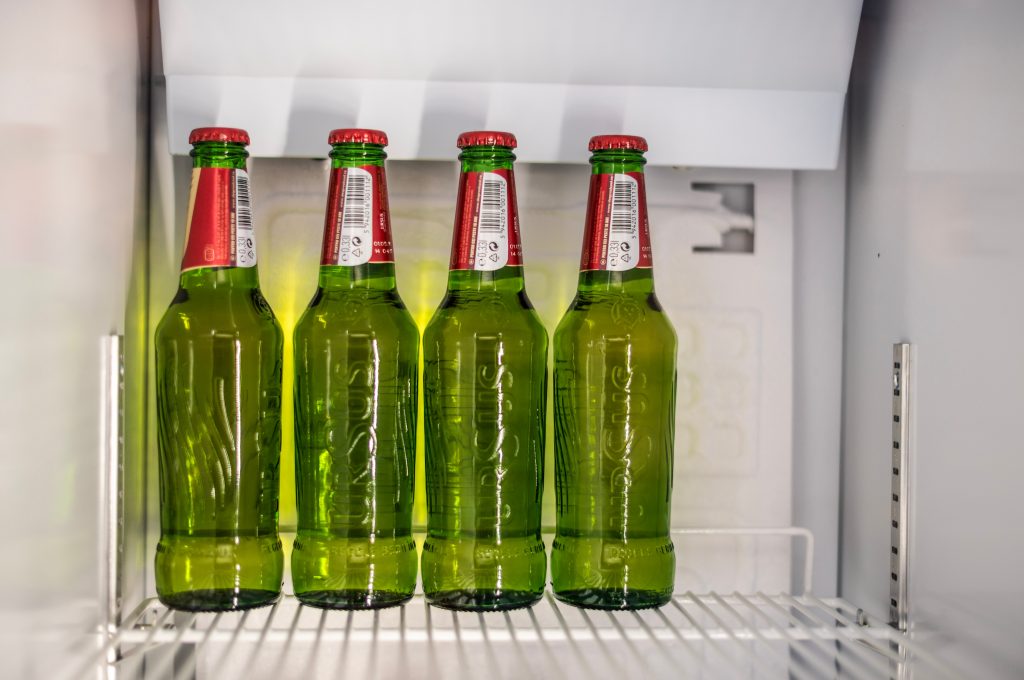This post contains affiliate links which we are compensated for if a purchase is made. Using links costs you nothing and helps to support the ongoing creation of content. Thank you for using them.
Will Homebrew Carbonate In The Fridge? If you have just completed and bottled a batch of beer there is a temptation to place some of the bottles into the fridge immediately ready to drink. But in those cold conditions will the beer carbonate?
Homebrew beer that is placed in the fridge immediately after bottling will not carbonate and will produce a flat beer on opening. The reason for this is that the temperature within a refrigerator, around 39°F (4°C), is too cold for yeast to remain active. Most varieties of yeast dormant at a temperature below 50°F (10°C) which means the yeast is unable to convert the priming sugar into ethanol and carbon dioxide.
To ensure that the beer is fully carbonated it is recommended that the beer be stored at 68 to 77°F (20 to 25°C) for a period of 2 to 4 weeks. The actual length of time that beer needs to carbonate is dependent upon the temperature, the type of sugar that is used for priming, and the type of beer.
At temperatures above 50°F (10°C) the activity rate of yeast will progressively increase resulting in increasingly rapid production of carbon dioxide. For homebrew, the preferable temperature to store bottles at is around 68°F (20°C). The reason for this is at higher temperatures the yeast begins to produce by-products such as fusel alcohol and esters that will affect the flavor somewhat. Esters in particular will result in an increasingly fruity taste and aroma.
The physical form of the sugar and its chemical nature will affect the rate of carbonation. Those home brewers that are using carbonation drops, which are essentially like boiled lollies, will take longer to carbonate the beer bottles because it takes additional time for them to dissolve into solution. In addition to this, the chemical type of sugar also affects that rate of carbonation. Monosaccharide sugars such as dextrose (commonly known as brewers sugar) is in a form that the yeast can immediately process whereas disaccharides such as sucrose (refined white sugar) must be broken down into simple sugars first before the yeast can process them. To read more about the different types of sugars click here.
Lastly, the type of beer and also affect the rate of carbonation somewhat with higher viscosity and specific gravity beers such as stout taking a little longer. This is thought to be a result of the mobility of the sugar within the beer. This is generally has a small effect with the temperature being the greatest factor.
To What Degree Does Temperature Affect The Rate Of Carbon Dioxide Production?
There are numerous studies on the rate of carbon dioxide production that have been published over the years, however, the 1965 study by N. Merritt provides a quantitative study that shows the degree of influence temperature has upon the activity of yeast. The graph shown below demonstrates that a change from 25 to 35C will have a 3 fold increase in the rate of carbon dioxide production.
This suggests that it is possible to carbonate the beer really quickly if you really impatient, however, I generally would not recommend rushing the process because while the beer may be carbonated its full flavour is yet to develop properly. I personally recommend waiting at least 4 weeks or so. To avoid this problem it is best to have enough bottles to hold at least 2 or 3 batches at a time to ensure you have a continous supply of properly aged beer.

